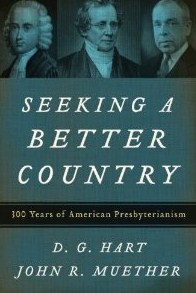Book Review: Seeking a Better Country


Seeking A Better Country: 300 Years of American Presbyterianism, D. G. Hart and John R. Muether, Phillipsburg: P & R Publishing, 2007. Hardcover, 288 pages, $25.00 US.
Surveys of history have a reputation for being major league snore fests – even for people with an interest in history. And church history surveys? The church history survey that can keep one’s attention for its full length is rare. More often such books are kept on hand as reference tools and seldom read from cover to cover. Seeking A Better Country is one of those rare, enjoyable church history surveys that is actually readable in its entirety.
The authors are well-known Presbyterian historians; both are members of the Orthodox Presbyterian Church. Both have numerous volumes to their credit. Though their allegiance to the OPC is evident in places, they have attempted to avoid a celebratory or triumphalistic approach to telling the story of Presbyterianism in the United States. Instead, they have provided a sober, critical history that endeavours to promote “self-awareness, discernment, and wisdom.” This is a laudable goal and one that, in my estimation, has been reached.
Some of the highlights of this story include the struggles between the Old Side and New Side of American Presbyterianism and, later on, between the Old School and New School. Of particular interest is the role of the Westminster Standards and confessional subscription. From the very beginning, there was no consensus on whether there should be confessional subscription in the Presbyterian church and, if so, what that should look like. Also fascinating is the place of revivalism in the history of American Presbyterianism. The authors tell of the Presbyterian background of Charles Finney and the relationship of revival meetings to the Scottish Presbyterian practice of communion seasons. Seeking A Better Country powerfully portrays the struggle throughout American Presbyterian history between pietists and confessionalists.
These days the name of Darryl Hart is often associated with a controversy over two-kingdom theology. “Two-kingdom theology” refers to a position by which the church’s authority is limited to spiritual matters. The church is called to proclaim the gospel. The church is not permitted to speak to or get involved with other areas of life, such as politics. Practically speaking, this means that the church cannot tell its members to vote for one political party as opposed to another. A careful reading of this volume may help readers to better understand the two-kingdom position. “The spirituality of the church” has been an emphasis in certain Presbyterian circles for a long time and failure to accept this concept is certainly at the roots of the historical development of churches like the OPC.
One critical remark I want to make has to do with Benjamin B. Warfield’s views of evolution. Our authors claim that Warfield “warmed up to evolutionary theory.” He did this by distinguishing the science of evolution from its associated philosophy. Moreover, Warfield pointed to Calvin as a proponent of “pure evolutionism” (179). This is not a nuanced presentation of Warfield’s position. Better on this point is Fred Zaspel’s The Theology of B. B. Warfield. Zaspel documents Warfield’s “strengthening conviction against evolution.” Moreover, he elaborates on Warfield’s understanding of Calvin. Warfield found Calvin to be inadequate and inconsistent. When it comes to evolution, Warfield was critically agnostic and noncommittal.
Historical awareness is critically important for Christians. Why? Because through awareness of history, we see how Christ has been working to gather, defend and preserve his people. At the same time, we also see how Satan has worked tirelessly to undo Christ’s efforts. As people with a background in the Reformed churches of the Netherlands, we probably know a little about that history (although even that might be presumptuous to say). Most likely we know far less about Presbyterian history on our continent. There are important lessons to be learned and Seeking A Better Country is a well-written and generally reliable guide.



